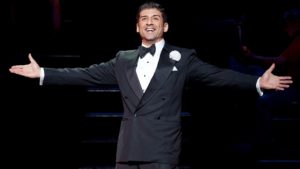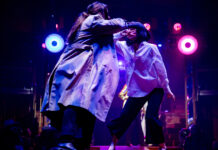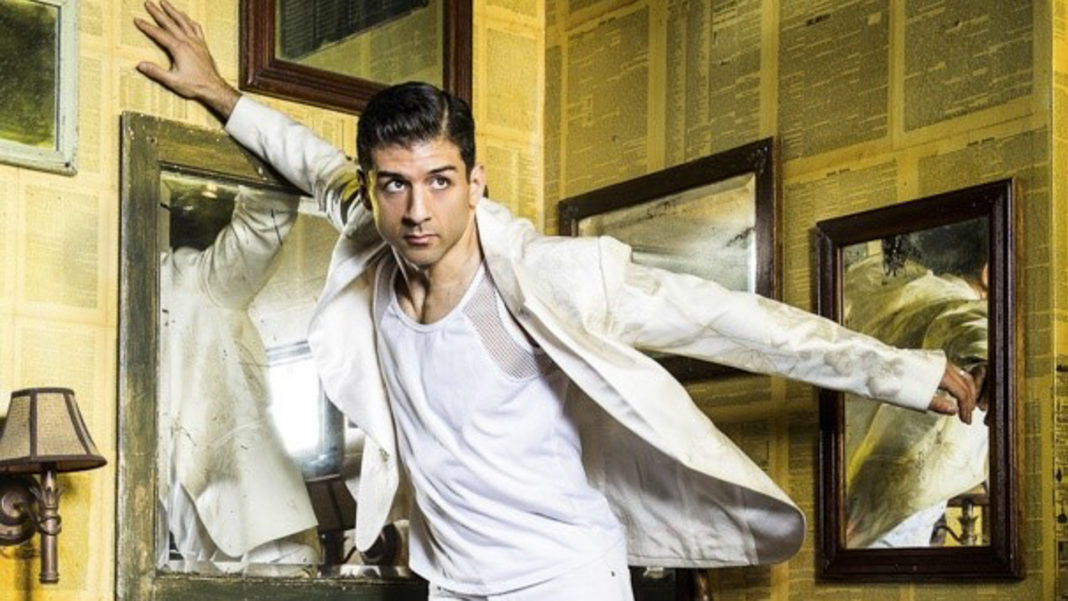Have you ever had the feeling you were born too late? That you missed out on the things that really influence your taste? Singer/dancer/actor Tony Yazbeck certainly does. Which is why the chance to sing the music of George and Ira Gershwin is something he’s done before and will do again on Saturday when he joins Michael Feinstein and the Pasadena Pops for Rhapsody in Blue at the LA County Arboretum.
Yazbeck began his Broadway career as a replacement newsboy in Arthur Laurents’ revival of Gypsy with Tyne Daly. He has played Billy Flynn several time in Chicago. He was Al in the revival of A Chorus Line; Tulsa in the revival of Gypsy with Patti LuPone and Gabey in the revival of On the Town. He received his first Tony Award nomination for that performance.
There may be a reason he’s in so many revivals. It isn’t just that Broadway likes to produce them. It’s where Yazbeck feels most at home – as I discovered when we spoke by phone about Gershwin, Broadway and loving simpler stories.
Not only for this concert, but you’ve done other shows celebrating Gershwin’s music. Why does his music speak to you?
I was raised as a kid with this music. It was maybe my father’s favorite music. I started dancing at four-years-old watching Fred Astaire on television. I think the first movie I saw was Shall We Dance which is where a lot of these songs we love got introduced. These were songs that were ingrained in me and made me happy in a simple way.
Whether or not they are part of this concert, but are there specific songs that resonate most with you?
Michael approached me with the songs. He has such a library of songs that are arranged for symphony orchestras. You don’t want to mess with them because most are derived from the original arrangements. I looked at them and said, “What can I do with these and put my stamp on it and still respect it?” There’s one number I’ll throw my tap shoes on for it. A ballad I’m singing is probably my favorite Gershwin song of all time: “How Long Has This Been Going On?” I think it is underrated. It resonates with those who find a connection and felt it was there forever. I’ll do like three numbers. If he asked me to do more, I know half the repertoire in my head already.
Most of your Broadway credits are revivals of classic musicals. As a song-and-dance man, do you think you were born too late? Or do you have the opportunity, perhaps the responsibility, to keep this great work alive by doing it now?
That’s a good question. I feel like I’m devoted and the reason I’m still in this business is that very question. We want to affect an audience. I was greatly affected by this music and this style when I was younger. It had nothing to do with the 1980s.
It’s a deep question: do we embrace technology now or do we say this has a place and “children…look here!” But I think it’s embrace it. We’re all on our phones all the time. People can’t look at a video for two minutes before their mind wanders. It will be fascinating to see what happens in the future. There is room for this thing, but we need to find writers and creators who can write new material based on the simple styles we heard like Gershwin back in the day. As amazingly beautiful as their melodies and arrangements are, they were simple. Somehow we decided simple wasn’t enough.

Even your 2016 album, The Floor Above Me, is more of a celebration of older material. Do you worry about an industry, meaning Broadway, that feels like Donna Summer, Cher and now Neil Diamond are the best sources for new musical material?
Everybody wants to feel immortal. That’s my first instinct as a dancer. It’s probably wrong. I don’t know why everyone needs to feel even more acclaimed and famous later in life after they’ve had their multiple decade careers. My thing is, is there a great story? Are they going to tell it in a way that’s brand new?
When I was in Gypsy with Tyne Daly in 1990-1991 coming to the city every day there was a magic and spark to it that isn’t around anymore. It’s about popularity and fame and “I want something in a certain way and I expect it and I’m going to get exactly what I want,” rather than buy a ticket a be completely surprised and overwhelmed by what I saw. That was the beauty of Bob Fosse or Michael Bennett – they gave the audience something to think about. We’re just spoon-feeding them what they know.
George Gershwin said, “True music must repeat the thought and aspirations of the people and the time.” Why does his music continue to do this almost 100 years later?
I think because honestly, a lot of things don’t change or really haven’t. It’s a little scary to think about. It’s crazy how we can’t learn after 100 years. We have music like Gershwin’s “Strike Up the Band.” You have this music that has fiery, angry heartbreak under this simple joyful melody. I think that’s why this music stands the test of time. In joy there’s darkness and vice-versa.
I learned a lot from Arthur Laurents. He said the emotional tone of Gypsy is melancholy. It was about an angry frustration under the dream that Tulsa had. But he has a fire underneath it. Nothing will stop him. On the top is bubbly joy, but underneath…If this isn’t like so much music out there that needs to be communicated. If this isn’t the heartbeat of us all. Like Gershwin. It will stand the test of time.
Photos courtesy of the Pasadena Pops











